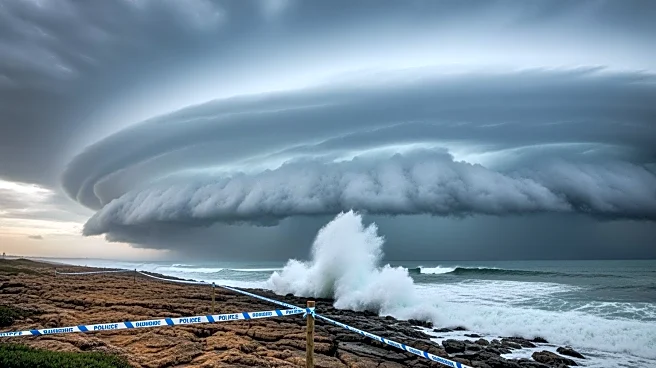What's Happening?
Hurricane Melissa, a category five storm, is approaching Jamaica with wind speeds reaching up to 175 mph, making it the strongest storm of the year. The National Hurricane Center (NHC) has issued warnings of 'catastrophic and life-threatening winds, flooding,
and storm surge' as the hurricane is expected to make landfall in Jamaica. The storm has already caused fatalities in Haiti and the Dominican Republic, with at least four people reported dead. Jamaica's government has ordered evacuations in parts of Kingston and declared the entire island as 'threatened.' The slow movement of the hurricane is expected to result in prolonged heavy rainfall, increasing the risk of severe flooding and landslides.
Why It's Important?
The potential impact of Hurricane Melissa on Jamaica is significant, as it threatens to cause widespread destruction and disrupt the lives of thousands. The storm's intensity and slow pace could lead to severe infrastructure damage, long-lasting power outages, and isolated communities. The economic implications are considerable, with potential losses in tourism, agriculture, and local businesses. The situation underscores the increasing frequency and intensity of such storms, attributed to climate change, highlighting the urgent need for improved disaster preparedness and climate resilience strategies in vulnerable regions.
What's Next?
As Hurricane Melissa approaches, the Jamaican government is taking precautionary measures, including evacuations and opening shelters. The NHC forecasts that the hurricane will continue to affect the region, moving towards southeastern Cuba and the Bahamas. Authorities are urging residents to comply with evacuation orders and prepare for the storm's impact. The international community may also respond with aid and support for recovery efforts post-impact. The situation remains dynamic, with meteorologists closely monitoring the storm's path and potential changes in intensity.
Beyond the Headlines
The threat posed by Hurricane Melissa highlights broader issues related to climate change and disaster management. The increasing intensity of hurricanes raises questions about the adequacy of current infrastructure and emergency response systems in the Caribbean. There is a growing need for international cooperation in addressing climate change and investing in sustainable development to mitigate the impacts of such natural disasters. The event also brings attention to the social and economic vulnerabilities of island nations, emphasizing the importance of building resilient communities.


















